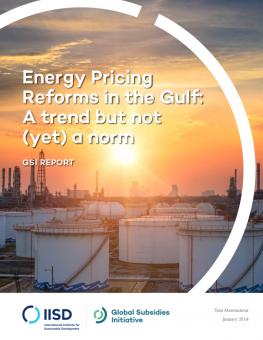
Energy Pricing Reforms in the Gulf: A trend but not (yet) a norm
This GSI paper summarizes recent fossil fuel subsidy reforms in the Gulf countries of Bahrain, Kuwait, Oman, Saudi Arabia, United Arab Emirates and Qatar, putting them in the context of wider developmental challenges and calling for more focused international support to energy pricing reforms in the region.
Since the oil price drop in the summer of 2014, Gulf countries have made significant advances in reforming heavily subsidized fossil fuel prices to domestic consumers.
Saudi Arabia reformed energy prices in 2015, after the United Arab Emirates implemented two large pricing reforms earlier that year. Oman, Bahrain and Qatar implemented price increases in 2016 and 2017. Some Gulf Cooperation Council countries that implemented automatic pricing mechanisms have regularly reviewed prices since. This paper from GSI summarizes these reforms and puts them in the context of wider developmental challenges in the Gulf. It also calls for more focused international support to energy pricing reforms in the Gulf region.
Participating experts
You might also be interested in
Saudi Arabia's grandiose climate plans struggle to take off
When Crown Prince Mohammed bin Salman announced Saudi Arabia’s "green initiative" this year he did so with the type of eye-catching pledge that has come to characterise the young royal's grandiose plans to modernise the kingdom.
The Context of Fossil-Fuel Subsidies in the GCC Region and Their Impact on Renewable Energy Development
The Cost of Fossil Fuel Reliance
Government support for fossil fuels reached at least USD 1.5 trillion in 2023, new data shows.
Increased Support Needed to Achieve India's Clean Energy Goals
India is on track to achieve many of its 2030 clean energy goals but needs to step up government support measures to accelerate the deployment of offshore wind, electric vehicles, and green hydrogen, according to a new report.